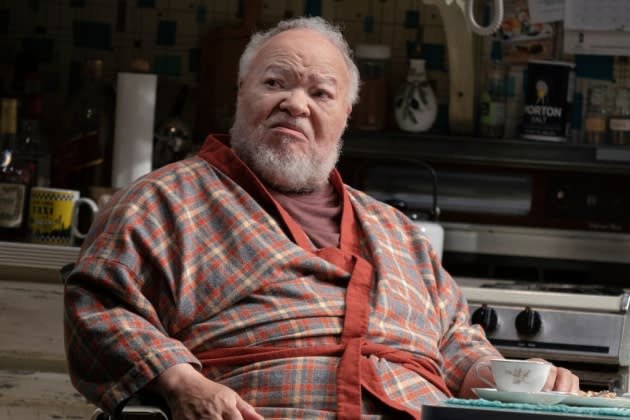‘Between Riverside and Crazy’ Review: Stephen Adly Guirgis’ Pulitzer-Winning Dark Comedy Makes Marvelous Broadway Premiere

How well can you ever really know a person? Do you judge by their actions, their hopes or some combination? Like many city creatures, the New Yorkers of “Between Riverside and Crazy,” now playing on Broadway in a Second Stage production, do whatever it takes to get by. The lies they tell in the process aren’t evasions — they reveal how people are shaped by circumstance and manage to survive.
Such is the beloved territory of playwright Stephen Adly Guirgis, who has captured the social constraints and vocal rhythms native to the upper recesses of Manhattan through the early 21st century in plays like 2000’s “Jesus Hopped the ‘A’ Train” and “Halfway Bitches Go Straight to Heaven” nearly 20 years later. Crackling with humor and shot through with surprises, “Between Riverside and Crazy,” which premiered off Broadway at the Atlantic Theater Company in 2014 and won the Pulitzer Prize for Drama, is both a captivating collection of character studies and an incisive indictment of the systems that act upon them. It’s a stunning intellectual achievement that’s also a total gas, a rare breed of theater deserving of protection at all costs.
More from Variety
The American Music Fairness Act Finally Puts Justice for Artists Within Reach: Guest Post by Common
'Cost of Living' Review: Martyna Majok's Pulitzer-Winning Drama Makes Sensational Broadway Debut
Gentrification has swept around the shores of Riverside Drive on the Upper West Side, where a widower named Walter, played by a magnificent Stephen McKinley Henderson, is hanging on to an enviable rent-controlled apartment. Grand and weathered, the place is freighted with decades of city living and functions as a lifeboat for the next generation (the walk-through revolving set is by Walt Spangler). A veteran and ex-cop, Henderson’s patriarch serves as an anchor for the people who call him “Dad,” regardless of their relation by blood.
That includes his son Junior (Common), newly released from prison though maybe not quite reformed and engaged in a scheme he tries to keep out of sight. Junior’s girlfriend Lulu (Rosal Colón) is studying to become an accountant, a prospect about which Walter has his doubts, pointing out the skimpiness of her morning outfits (she’s crashing there, too) and the fact that she moves her lips while reading her horoscope. And Junior’s best friend Oswaldo (Victor Almanzar), whose demons include a destructive alcohol addiction and his own disappointed father, perhaps needs Walter most of all.
Guirgis builds characters from the sum of small details (Oswaldo’s choice of breakfast foods alone could tell his entire story), and times their revelations to toy with expectations. It’s not until the end of the first scene, for example, in which Walter eats pie and spikes his morning coffee with whiskey, that we learn he can walk. The wheelchair he’s sitting in belongs to his late wife — it’s just the most comfortable seat at the table. Walter does have his maladies, though, from a violent incident that ended his career on the force, and for which he’s waging a protracted legal battle against the NYPD.
If everybody hates cops, they especially don’t like Black cops, who, Walter says, are caught between racist white peers and the resentment of Black civilians. But he and his first partner, Detective O’Connor (Elizabeth Canavan), were so close that she wants him to walk her down the aisle. She’s engaged to a fellow officer, Lieutenant Caro (Michael Rispoli), and they’re trying to get Walter to accept a deal and stop causing such a headache for their bosses downtown. The tensions that flare between them are at once deeply personal and illustrative of the broader crosscurrents — race, wealth and the power they confer and deny — that Guirgis has long investigated.
Under the direction of Austin Pendleton, most of the cast from the Atlantic Theater Company production returns with as much ease and richness as if they had lived inside the characters for as many years. Henderson is a formidable, once-in-a-generation talent, and his performance as Walter is a high point in an already indelible career, allowing a star who’s often appeared in supporting roles to take center stage. His Walter is gruff without turning sour, determined to raise hell despite the long odds. Henderson tosses off verbal firecrackers, one after another, often with casual aplomb, exerting the hard-earned authority of a man who enforced the rules and still lost the game. Though Walter has little in the way of ammunition, he’s also got nothing to lose, so he figures he might as well be a pain in the ass.
It would be possible to consider those in Walter’s orbit as stock types, but expectations are subverted by Guirgis and by some wonderfully specific performances from the cast. Rispoli does especially fine work as Lieutenant Caro, a gambler with a head for middle management and ambitions to ascend the ranks. Colón, whose Lulu might be a sort of airhead who lies to keep her man, lends the character an endearing transparency and warmth. Almanzar does similarly for Oswaldo, whose playful vulnerability is both dangerous and ultimately devastating.
If there is only so much we can know about another person, it’s just as well that some parts remain a mystery. It’s the assumptions we make, and what they say about us, that are worth continuing to question.
Best of Variety
Sign up for Variety’s Newsletter. For the latest news, follow us on Facebook, Twitter, and Instagram.
